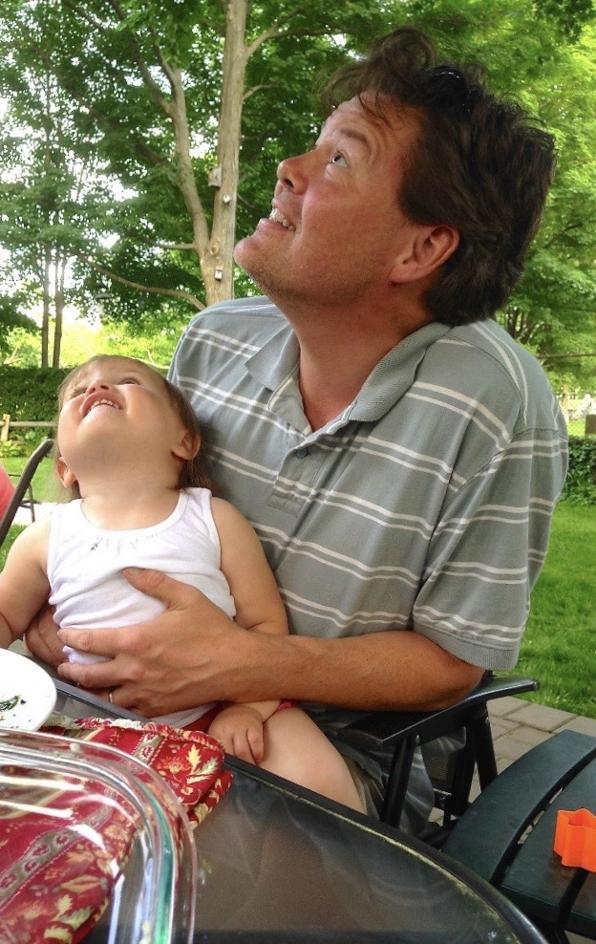
It’s my favorite picture of me and my niece. We’re both looking up, heads tilted back in tandem, eyes fixed high above. Paige wasn’t even 2 then, so little I held her so she wouldn’t fall off my lap as she scanned the sky, searching for a flash of color that had caught our eye.
It was a moment of simple, pure connection, of shared wonder. On a warm, spring afternoon spent with family, a backyard cookout that drifted along for hours and seemed to set the world right.
It’s the kind of closeness and belonging that we’ve lost in this time of isolation and grief, the kind we miss so dearly. The power of common experience, the familiar comfort of being with the ones we love. The chance to lift your sights and see the world through a child’s eyes.
Such memories seem distant amid so much despair, when couples who have spent their lives together can’t say their final goodbyes, when countless families face financial ruin, when each day blurs into a numbing gray, the rising death toll the only clear boundary.
But even as we hunker inside or don masks to wait in staggered lines at the grocery store, suspiciously eyeing each other as walking contagions, signs of hope and solidarity aren’t hard to find.
The sweet messages kids are writing on the sidewalk, for the people inside. I passed one the other day in my neighborhood that read “You’re not alone’’ with hearts around it. Passersby took care to walk around, so it wouldn’t fade.
The way people press their hands against nursing home windows, their love passing through like light. The block parties where neighbors raise their glasses together from across the street, smiling at the strangeness of it all. The drive-by birthday parties that roll past the way parades used to, drawing people up and down the street outside to watch and wave. The Little Free Library around the corner now filled with food.
My niece Suzy, all of 6, was even inspired to write her first song, which she dedicated to “people that, really really really bad, miss their Mom and Dad and brother and sister.’’ It was sweet and caring, just like her, and she sang it beautifully.
On Easter Sunday, I ran one of my favorite trails, an old rail line that passes by Great Meadows National Wildlife Refuge in Concord. It’s always been a sublime place, an expanse of river wetlands that abounds with life, from gliding blue herons to darting swifts and swallows. A narrow path runs between two pools, carrying you low across the water.
Lately, it’s even more beautiful, somehow. The air is crisper, the colors sharper. The water shimmers in the sun. The shaded paths feel safe and untouched, a world apart.
After circling the reserve, I wound my way through the pines to the main trail, and headed back. With about 2 miles to go, I saw three pinwheels planted on the edge, twirling blue in the breeze.
Pinwheels pop up in April as a symbol of happy childhoods, to raise awareness of child abuse prevention. For the kids who plant them, I imagine they’re akin to the sidewalk messages, a gift of hope to those who need it.
Maybe it was the glorious weather, the rush that spring had really arrived. Maybe it was Easter’s message of renewal and redemption. Maybe it was a depth of joy only sorrow can find.
I didn’t question why. But for the first time in weeks, my troubles fell away, swept aside by something that felt like grace. An old Tom Waits song came back to me, “San Diego Serenade.’’ About regret, how loss and distance reveal things in full, the way they really are.
“I never saw my hometown until I stayed away too long,’’ he sings. “I never heard the melody until I needed the song.’’
Crisis can give you a hard-won clarity. About what truly matters, and how easy it is to take for granted. How desperately we want to be together, but struggle to find the time. That there’s beauty all around us, if we pause to look.
After my Easter Sunday run, my wife and I went to visit her brother, his wife, and our nieces. We hadn’t seen them in person in weeks, only on screens. Normally I’d scoop the girls up and swing them through the air. This time, we set their Easter baskets in the middle of the driveway and retreated to our side of no-man’s land.
We watched as they opened their candy, stuffed animals, and invisible ink coloring books. They told us about the new “Trolls’’ movie and learning to ride their bikes without training wheels. We talked about all the restaurants we would go to when this was over, old favorites and ones we hadn’t tried. It would be so much fun, we all agreed.
Paige asked when they could come over to our house for a sleepover. Soon, we said. When we left, we hugged the air and blew kisses.
Paige is 7 now, and we’ve had countless great moments since that cookout. But the image of us looking up together has never left me, and after our visit Sunday I scrolled back through Facebook to find it, for a reminder of happier times.
Suddenly, I remembered what was so beautiful that day, why we looked up so earnestly. The pinwheels had brought it back. It was a bluebird, resting on a high branch, as if there just for us.
By myself, I might hardly have given it a glance. But with my niece on my lap, it was magic, a feeling that even now gives me hope.
After all, viruses don’t survive long in isolation. But love does. It lasts, like the memory of a bluebird’s song.
Peter Schworm can be reached at peter.schworm@globe.com. Follow him on Twitter @globepete.